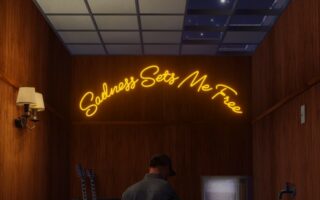 The Crookes are a band that show what happens when pop music goes right.
The Crookes are a band that show what happens when pop music goes right.
The Sheffield four-piece, three albums in, shunned the creature comforts of South Yorkshire and instead drove their gear and recording facilities to the Alpine wilderness of Italy at the start of last winter – thus, the sound of isolation, desolation and solitude can be heard in each of ‘Soapbox‘s ten tracks.
It’s indie yes, it’s pop yes, but it’s also punk, post-punk and electro; it can’t be confined to one genre despite all the dark undertones that swim beneath the surface of a band constructing songs which speak of intelligence and should have Morrissey’s haircut and Brett Anderson’s waistline.
‘Play Dumb’ sounds like what you’d get if you put the band in a comic book designed by Andy Warhol; impelling and intoxicating with techno keyboards that dominate. The keyboard layers climb up the walls, bounce off and fall back into place, guitars plucked high and screeching like spikes on some lonely radar, the vocals genuinely sincere with their young and innocent manner, able to keep secrets, admit crimes or sentence to death by the power and potency of how they wrap around the track.
‘Don’t Put Your Faith In Me’ opens with one of those big riffs before dropping out and diving back in – revealing the nakedness of the track but also its ability to surprise. A bass line palpitating in the background as the chorus sings lyrics of admitting wrong doings. Faith then should never be put in the hands of a singer that’s been through the shit and made it out alive on the other side with an angel’s vocal chords still intact.
‘Echolalia’ demonstrates the use of space and serenity in a song, allowing it to breathe and really explore what church halls and reverb can do. The harmonious guitar parts are complex and creative, complimenting the bare nature of the song. ‘Before Night Falls’ is more noisy, but still beautiful before it meets a beating beneath a blue sky hanging from a voyeuristic landscape; the romance in the atmosphere is finely tuned to friends falling in love as the drums roll in and out and guitars jingle-jangle, adding some sense to the state of unbalance.
A slightly more religious theme takes the album’s analogy. It was after all recorded in a city of buildings too perfect to be of this world. ‘Holy Innocents’, just a lonesome piano and a raw voice, is still delicate in all of its fragile details; a ballad for the bedroom of a boy losing his mind to love.
‘Outsiders’ reintroduces the more festive and euphoric aspect to the band’s sound, those climactic and cinematic strokes of near-perfection still apparent. It’s experimental, and mental, but doesn’t eliminate the elements of intrigue to the point of becoming an endless cycle of cynical observations about how the world is; it’s concise, and clever. ‘When You’re Fragile’ opens with fragile guitar lines, the vocals menacing in their narration of overcoming the hardest of obstructions; oddly funky and fun with the way each melody, in every instrument, is distinct and direct, submerged in magnificent studio effects to create the most affecting of tracks.
‘Marcy’ is brave and bold, soaring just after the dust has settled, guitars jagged and jarring as the bass slouches against the other instruments, while ‘Howl’ – slightly more domesticated and docile – creates lush and syrupy tales of two being torn apart, but not abandoning the weird and wacky wonders which the band are now so easily striding. The bass line accents the vocal melody; the vocal melody adds to the guitar melody; the drums are sedated and simplistic, as though a tidal wave washing over the shore is spitting out memoirs of the past.
Pop music is seen as a trend, not a career choice, but when a band totally submerse themselves in its ins and outs, in the heartaches and hardships of what pop music can deal with when executed correctly, the results are rather remarkable.
They are the surveyors, and purveyors, of great music to dance to for the most depressed of souls that encounter them.


